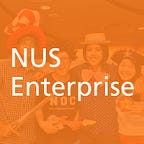Deep diving into the beauty and dynamics of building smart cities
A conversation with the experts from Kopi Chat Deep Dive Series: IOT in Smart Cities
Contributed by Chen Yi Ting and Jermaine Ng
As part of Singapore’s shift towards a knowledge-based economy powered by intellectual capital, Smart Nation Singapore was launched in 2014 with more than a billion dollars invested by the government. This is in line with the global digital transformation in more economically developed countries like China, which has major top-down initiatives to promote new digital infrastructure across its cities.
Participants from start-ups, large corporations, institutes of higher learning and research labs attended our Kopi Chat Deep Dive session focused on uncovering Singapore’s digital ecosystem. The specially curated panel is formed by:
- Deepak Pitta, CEO of SpaceAge Labs
- Michael Goh, Director of Sales (ASEAN), Security and Safety Systems at Robert Bosch
- Justin Chin, Head of Partnerships at IOT Tribe SG
- Moderator: James Ong, Director at Artificial Intelligence International Institute
What’s IOT used for?
IOT in Singapore is generally applied for two purposes — reduction of manual labour and prediction capabilities. For instance, Deepak, whose start-up is working with PUB and Nparks by providing IOT solutions for energy monitoring, street light monitoring, environmental & weather monitoring, mentioned checking water quality is traditionally a physical task but IOT has allowed for low-powered sensors and data analysis on the cloud. Data collected from sensors can also be used to predict future conditions and prevent overflooding of drains during monsoon seasons.
Space for improvement
As Singapore advances digitally, there are two key areas which all panelists agree would greatly boost efficiency and reduce costs in the current ecosystem. The first area is the creation of a standard protocol within the country for all tech start-ups to follow. Currently, different vendors may contribute to different parts of the system, resulting in several points of connection, cybersecurity risks like interception of data, and effort spent on system integration. The second area is digital transformation services that need to be provided as a consultant to traditional companies to connect with tech start-ups.
Here’s an infographic summing up the key take-aways for this Kopi Chat Deep Dive.
What’s next?
5G, DNA storage and digital twins are part of the next breakthrough for the tech scene in Singapore. IOT has led to a heavy influx of data being collected and it is predicted that the current silicon-based storage would not be enough to contain the data. Thus, biological storage is expected to be in demand as it is able to reduce the volume of storage by thousands of times. Digital twin, a digital representation of a physical item, is another key area Justin notes several companies are researching on.
In addition, here are some tips from Deepak and Michael for tech start-ups:
- When working with big firms, ensure there is a buy-in from the top.
- According to Deepak’s experience, large companies may only innovate for innovation’s sake and not have real commitments for pilots. It is thus vital to know more than a single person in the company and never do any free pilots.
- For start-ups with no track records or financial support, partner with a system integrator to win tender bids.
- SpaceAge Labs won the bids to work with a Singapore agency by becoming subcontractors with water contractors who can get down into the drainage system and install sensors for them.
- Starting with the problem statement is key for faster adoption rate.
- Michael claims that while it may be intuitive for start-ups to begin with a technology or product before sourcing for potential customers, starting with the customer and problem statement, while thinking about the scalability of the product can be more efficient, considering large development costs of new technology.
Interested to rewatch the video for insights? Check it out here at http://bit.ly/SmartCitiesReplay
